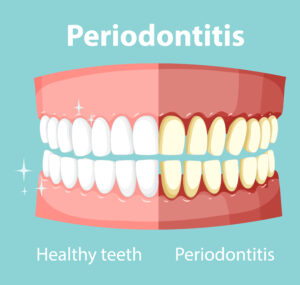Periodontal disease is more commonly known as gum disease. It is a serious infection of the gums that can lead to tooth loss. There is a two-way link between diabetes and periodontal disease because high blood sugar levels can result in the development of gum disease in Johns Creek. In turn, gum disease can make diabetes more difficult to manage as it also increases blood glucose levels.
Diabetes and Periodontal Disease
What is Diabetes?
Diabetes is a condition where there is too much sugar in the blood. This can happen because the pancreas doesn’t produce enough insulin, or because the body can’t use insulin properly. When a person has been diagnosed with diabetes, they experience an imbalance in their blood sugar levels.
When this happens, the body is unable to use the sugar in the blood for energy. This can lead to a number of serious health problems, including heart disease, stroke, kidney disease, and blindness.
Despite this, there are now a lot of ways to manage diabetes and live a healthy life. Doctors recommend that people with diabetes monitor their blood sugar levels and take medication to keep them under control.
What is Periodontal Disease?
Periodontal disease is an infection of the gums that can lead to tooth loss. It is caused by bacteria in plaque, which is a sticky film that forms on your teeth. When plaque is not removed, it turns into tartar.
Tartar is a hard deposit that can only be removed by a dentist or hygienist. If tartar is not removed, it can damage the gums and the bone that supports the teeth. This can eventually lead to tooth loss.
Periodontal disease is common in adults, but it can happen at any age. People with diabetes are more likely to develop periodontal disease. This is because high blood sugar levels make it harder for the body to fight infection.
What are the Symptoms of Periodontal Disease?
The early stages of periodontal disease often don’t have any symptoms. This is why it’s important to see a dentist regularly for check-ups. As the disease progresses, the symptoms may include:
#1 – Bleeding Gums

One of the first signs of periodontal disease is bleeding gums. This can happen when you brush your teeth or floss. The gums may also bleed after eating or drinking.
#2 – Swollen Gums
Another symptom of gum disease is swollen gums. The gums may feel tender or painful. They may also look red and inflamed.
#3 – Bad Breath
Bad breath is another common symptom of gum disease. This is because the bacteria in plaque can cause an unpleasant smell.
#4 – Lose or Sensitive Teeth
As periodontal disease progresses, the gums may start to pull away from the teeth. This can make the teeth look longer than they actually are. The gums may also be sore and sensitive.
#5 – Pain When Chewing
Another symptom of periodontal disease is pain when chewing. This is because the infection can damage the gums and teeth.
#6 – Receding Gums or Teeth Appearing Longer
As periodontal disease progresses, the gums may start to pull away from the teeth. This can make the teeth look longer than they actually are. The gums may also be sore and sensitive.
How Can We Treat Diabetes and Periodontal Disease?
In order to prevent diabetes from being more difficult to manage in the presence of gum disease, a patient will need to deal with the infection. There are a number of ways to do this, and the treatment will depend on the severity of the disease.
Treatment Fact #1 – Scaling and root planing are your primary options for treatment.
Scaling and root planing is a deep cleaning procedure that removes plaque and tartar from below the gum line. This helps to reduce inflammation and allows the gums to heal.
Treatment Fact #2 – Your doctor will most likely give you antibiotics.
Antibiotics can also be used to treat periodontal disease. They can be taken as a pill or applied directly to the gums.
Treatment Fact #3 – Surgery may be necessary.
In severe cases, surgery may be necessary to treat periodontal disease. This includes procedures like gingival flap surgery, soft tissue or bone grafting, and guided tissue regeneration, or the use of tissue-stimulating proteins.
Schedule a Consultation to Receive a Diagnosis and Treatment for Periodontal Disease

Periodontal disease is a serious infection that can lead to tooth loss. You need a deep understanding about diabetes and periodontal disease since people with diabetes are especially at risk for developing this disease. If you think you may have gum disease, it’s important to see a dentist or orthodontist as soon as possible.
At Ricci Orthodontics, we specialize in providing quality treatment for periodontal disease at our office in Johns Creek, GA. If you need periodontal treatment in Johns Creek, GA, the earlier you receive this care, the better. In fact, through early treatment, you are less likely to suffer permanent damage to your gums, teeth, and bone.
If you show signs of periodontitis, you need oral hygiene orthodontics. When you schedule a consultation with Dr. Steven Ricci, you will receive a full examination. We will then develop a treatment plan that is tailored to your specific needs.
Don’t wait to get the treatment you need for periodontal disease. Schedule a consultation with Dr. Ricci today! If you have any questions about diabetes and periodontal disease, please feel free to contact us at (678) 417-9848 or visit our website. We also offer all types of braces, Invisalign, retainers, TruDenta headache relief, oral cancer screening, and other orthodontic services.
Tags: orthodontic services johns creek ga, Orthodontics in Johns Greek, Orthodontist in Johns Creek, Peridontal disease in Johns Creek
